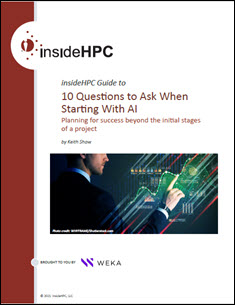March 22, 2023 — The Texas Advanced Computing Center has announced that simulations on TACC’s Frontera supercomputer have helped scientists map for the first time the conditions that characterize exotic electrons, called polarons, in 2D materials, the thinnest materials ever been made. “A new leaf has turned in scientists’ hunt for developing cutting-edge materials used in […]
TACC: Frontera HPC Helps Reveal Weaknesses in HIV-1 ‘Armor’
The Frontera supercomputer at TACC has furthered scientists’ understanding of how the HIV-1 virus infects and helped generate the first realistic simulations of its capsid, complete with its proteins, water, genetic material, and a key cofactor called IP6 recently discovered to stabilize and help form the capsid. “The vulnerabilities in the armor of the HIV-1 virus capsid were revealed by these very big simulations and the analysis we did,” said Gregory Voth, the Haig P. Papazian Distinguished Service Professor at the University of Chicago. Voth is the lead author on the HIV-1 capsid study published in March 2022 in the Proceedings of the National Academy of Sciences.
Univ. of Michigan Researchers Using TACC Frontera HPC for Space Weather Forecasting
“There are only two natural disasters that could impact the entire U.S.,” according to Gabor Toth, professor of Climate and Space Sciences and Engineering at the University of Michigan. “One is a pandemic and the other is an extreme space weather event.” We’re currently seeing the effects of the first in real-time. The last major space […]
New Cornell Virtual HPC, Data Science, Machine Learning Workshops at XSEDE
ITHACA, NY – Cornell University announced today that four new Cornell Virtual Workshop training topics are available at the Extreme Science and Engineering Discovery Environment (XSEDE) User Portal: Getting Started on Frontera Introduction to Advanced Cluster Architectures Using the Jetstream APIs Python for Data Science: Part 2 – Data Modeling and Machine Learning Cornell Virtual Workshop topics are freely available at all times to the entire scientific community – […]
HPC at TACC, PSC, Univ. of Chicago Supports Completion of 1st Multiscale COVID-19 Virus Model
The Texas Advanced Computing Center has announced completion of what it said is the first complete, multiscale model of the SARS-CoV-2 virus, a project that leveraged HPC resources at TACC, the Pittsburgh Supercomputing Center (PSC) and the University of Chicago Research Computing Center (UCRCC). According to an article published late yesterday by TACC Technical Writer […]
TACC’s Frontera HPC System Expansion for ‘Urgent Computing’ – COVID-19, Hurricanes, Earthquakes
Frontera, deployed at the Texas Advanced Computing Center supercomputer and the ninth fastest HPC system in the world, will receive an expansion to support urgent computing and basic science, according to TACC. The expansion is funded by an award from the National Science Foundation (NSF) and a contribution from Dell Giving, the philanthropic arm of […]
COVID Camouflage: TACC’s Frontera Reveals Virus’s ‘Sugar Coating’
Researchers using the Frontera supercomputer at the Texas Advanced Computing Center (TACC) have uncovered the atomic makeup of the sugary shield on the coronavirus that could prove instrumental to the workings of the contagion, now spreading death, illness and economic destruction around the world. UCSD scientists have used about 2.3 million Frontera node hours for molecular dynamics simulations and modeling.
TACC’s Frontera Supports Investigation of Subatomic Protons – ‘the Origin of the Mass of Objects’
A team of researchers are using the Frontera supercomputer at the Texas Advanced Computing Center (TACC) to crack open the proton, a fundamental building block of the atomic nucleus that is used, among other ways, as a medical probe in magnetic resonance imaging. Frontera, the world’s fifth-ranked HPC system on the Top500 list and the […]
Interview: Fighting the Coronavirus with TACC Supercomputers
In this video from the Stanford HPC Conference, Dan Stanzione from the Texas Advanced Computing Center describes how their powerful supercomputers are helping to fight the coronavirus pandemic. “In times of global need like this, it’s important not only that we bring all of our resources to bear, but that we do so in the most innovative ways possible,” said TACC Executive Director Dan Stanzione. “We’ve pivoted many of our resources towards crucial research in the fight against COVID-19, but supporting the new AI methodologies in this project gives us the chance to use those resources even more effectively.”
NSF awards compute time on Frontera Supercomputer for 49 projects
The most powerful supercomputer in the world for academic research has established its mission for the coming year. “The NSF has approved allocations of supercomputing time on Frontera to 49 science projects for 2020-2021. Time on the TACC supercomputer is awarded based on a project’s need for very large scale computing to make science and engineering discoveries, and the ability to efficiently use a supercomputer on the scale of Frontera.”











